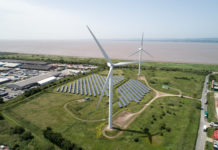
Greg Clark has encouraged closer collaboration between the energy industry and car manufacturers to better decarbonise both energy and transport. The secretary of state for business, energy and industrial strategy also urged all UK firms to help shape future national industrial policy.
Speaking yesterday at a Policy Exchange event, Clark outlined how the UK could maximise long-term impacts of policy decisions that will affect national welfare.
Decentralisation
Decentralised decision making will be key to ensuring industrial strategy benefits all workers, according to the former communities and local government department chief.
“We need to increase productivity in aggregate and inclusively across all sectors of the country and economy,” said Clark, pointing out that while “decades of centralised policy” had revived London’s fortunes, “that has taken its toll” on regional UK.
“In my view, investment decisions for too long taken in London, will be much better taken by local economies,” he said.
Unlock energy storage
Clark’s decentralisation agenda mirrors structural change occurring in the energy sector. The secretary of state reiterated his belief in energy storage solving renewable generation’s intermittency as well as decarbonising transport, progress on which has stalled.
He said cross-industry collaboration on storage could unlock higher value for the UK as a whole.
“The green economy is one of the most exciting areas of our future planning and organisation and in many ways is a good example of why we need to bring policy together,” said Clark, who spent two years as shadow energy secretary.
“We now have some of the highest levels of investment in renewable technologies in Europe … but one of the challenges of renewable [generation] technology is intermittency.”
However, intermittency “can be accommodated through storing energy and making the grid much more interactive, both of which require a policy response,” said Clark.
“[The UK storage sector] is undertaking some of the best R&D in the world, which is of intense interest not only to the green economy but to the automotive sector,” he said.
“So the ability to marry energy and automotive [goals] is a wonderful opportunity that would be crazy to separate and dilute.”
The Business, Energy and Industrial Strategy (BEIS) Committee will examine that opportunity via a new inquiry, also launched yesterday, into the role electric vehicles (EVs) can play in decarbonising the economy as part of the industrial strategy. Clark said the two sectors were becoming intrinsically linked.
“If you can create jobs in both sectors and simultaneously address problems that do not respect boundaries… that is a huge opportunity.”
Environmental policy ‘not a tradeoff’
The business and energy secretary added that while energy security is “foundational” to the economy, “my view is not to see these things as tradeoffs: that you can only either be green or low cost, either have security of supply or be environmentally progressive; these need to be pursued simultaneously.”
With an agile, digitised grid and sufficient energy storage, said Clark, “the energy you produce can be clean and low cost. A forward-looking strategy enables you to make … simultaneous equations rather than tradeoffs.”
UK firms: help set policy
Clark called for businesses to engage in the industrial strategy to ensure their voices are heard in creating policy. Doing so is in the national interest, he suggested, quoting Bank of England governor Mark Carney: “Every technological revolution mercilessly destroys jobs and livelihoods – and therefore identities – well before the new ones emerge”.
“While the robot revolution may seem some way off,” said Clark, “automation will have a big impact on all of our lives. So if we want people to have satisfying, well paid jobs, we have to prepare – and that is precisely the purpose of the industrial strategy.”
See the green paper here.
Related stories:
Nissan and Eaton rollout commercial scale battery units
Nissan turns on 4.75MW solar plant, eyes battery storage market
Somerset site to install ‘grid scale’ Tesla battery unit
Tesla: People don’t engage with energy bills, but they will have to
Vattenfall plans 22MW battery storage facility at South Wales wind farm
National Grid awards £66m of battery storage contracts
VLC Energy to connect 50MW of battery storage in 2017 after EFR contract win
Battery storage: positive outlook?
National Grid must provide a plan for battery market, says SmartestEnergy
National Grid signs 20MW demand-side response contract with battery storage operator
Open Energi and Camborne Energy Storage take Tesla battery into frequency response market
Scottish Power asks Ofgem to change classification of batteries in capacity market
Centrica: Floodgates to open on battery storage this summer
UK Power Networks receives 12GW of battery storage applications in 15 months
Capacity market too low for large gas, but gigawatts of DSR, batteries and CHP win contracts
Infrastructure chief: UK could be energy storage world leader if government acts now
Government backs Adonis’ smartgrid plan, pledges £50m+ for storage and demand response
More than half of I&C firms mulling energy storage investment
National Grid says UK will miss 2020 targets, predicts big battery future
Eon opens 2MW battery storage facility
Hot technology: energy storage via heat battery
Free report: DSR and battery storage
Follow us at @EnergystMedia. For regular bulletins, sign up for the free newsletter.



